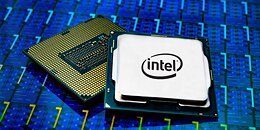Tuesday, January 21st 2020

Intel Reportedly Looking Into Further Reduction in CPU Pricing for 2020
Intel's policy on CPU pricing has been a strong, definite one for years: no price reductions. Faced with less than admirable competition from a struggling AMD back in its Phenom and especially Bulldozer days, Intel enforced a heavy hand on the market and on CPU pricing. However, a much revitalized AMD and difficulties in the transition to the 10 nm process have left Intel with no other recourse than to cut pricing on its CPUs in order to remain competitive. No uptake of new I/O technologies such as PCIe 4.0 has also taken its toll on Intel's position in the server and HEDT market, which has led to recent price-cuts and tightening of Intel's Xeon line of CPUs - as well as price-cuts in the order of 50% in their Cascade Lake-X processors compared to the previous generation.
DigiTimes, citing industry PC makers, says that Intel is gearing up to keep fighting in the only front it actually can, besides puny core count increases on their heavily-iterated Skylake architecture - pricing. This move comes in a bid to keep its market dominance, which Intel themselves have said - after Zen 2, that is - isn't a priority for the consumer market. You can rest assured that Intel is very, very likely already practicing hefty price reductions for tray-quantity purchases for partners. However, it seems that the company might bring some price cuts on to its upcoming Comet Lake CPUs. The company has always been loathe to reduce pricing on existing inventory, rather choosing to reduce the price on new launches (see the Cascade Lake-X example above), which, arguably, saves Intel's face on claims of only being able to compete on pricing - which lurks dangerously close to Intel being painted as the budget, price-cut alternative to AMD.
Sources:
DigiTimes, Tom's Hardware
DigiTimes, citing industry PC makers, says that Intel is gearing up to keep fighting in the only front it actually can, besides puny core count increases on their heavily-iterated Skylake architecture - pricing. This move comes in a bid to keep its market dominance, which Intel themselves have said - after Zen 2, that is - isn't a priority for the consumer market. You can rest assured that Intel is very, very likely already practicing hefty price reductions for tray-quantity purchases for partners. However, it seems that the company might bring some price cuts on to its upcoming Comet Lake CPUs. The company has always been loathe to reduce pricing on existing inventory, rather choosing to reduce the price on new launches (see the Cascade Lake-X example above), which, arguably, saves Intel's face on claims of only being able to compete on pricing - which lurks dangerously close to Intel being painted as the budget, price-cut alternative to AMD.

50 Comments on Intel Reportedly Looking Into Further Reduction in CPU Pricing for 2020
Thanks AMD
Fuck them.
Nope.
If they have shortages, and everything is selling out and they are still making more money in a quarter than AMD in a year, they could probably raise prices if they wanted to.
On the consumer side at least. On the enterprise side, statement is probably somewhat true, but would loose some market share. I know we just bought a bunch of servers, I asked for AMD, and IT dept. got Intel servers.................
Take away this artificially pent up "demand" & their numbers aren't all that great, especially against Athlons & R3 where Intel is horrendous value not to mention anorexic performance!
Currently: Intel IPC = 1 (except for ULV mobile where some SKUs are 1.18), AMD IPC = 1.067; either 6.7% advantage AMD or 10,6% advantage Intel, depending on the SKU. AMD Zen 2 mobile chips are not yet out, Intel Ice Lake desktop chips are likely never arriving. Intel 14nm clocks higher than AMD/TSMC 7nm, which again clocks higher than Intel 10nm. Intel 10nm is still struggling with yields given how much more common 14nm Comet Lake is than Ice Lake (Comet Lake also outperforms Ice Lake due to higher clocks).
Later this year/early next year: Intel IPC = ~1.299, AMD IPC = ~1.227; ~5.8% advantage Intel. No idea about clock speeds, but expecting Intel 10nm+ to bypass TSMC 7nm+ sounds unlikely.
This looks like a tightly competitive market, which is exactly what end users should want, and would mean that features and price rather than raw performance becomes the main points of competition. This is excellent, and going to be very, very interesting.
Barring a major reversal in fortunes, Intel's seriously looking down the barrel over the next few years.
Cheaper, more powerful, less consuming and plenty of stock (compared to Intel).
They only have a part of server market, due to the momentum of this matter, and then remains professional laptops.
If they lose that, they lose it all !
All depends what competetive means. If it means earning good profits, then I would say they are doing well.
If it means good price/performance vs. competitions offerings for consumers & enterprise, then obviously not.
Now usually if you can't compete or not competitive you go the way of the dodo, and I don't see that happening to Intel in the immediate future.I don't disagree one bit, and I do agree they should be more competetive in price vs. performance. But I guess my question is, do they have to or even want to given the profits they are making now anyways?